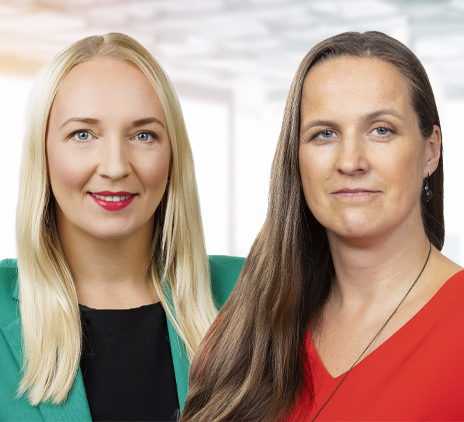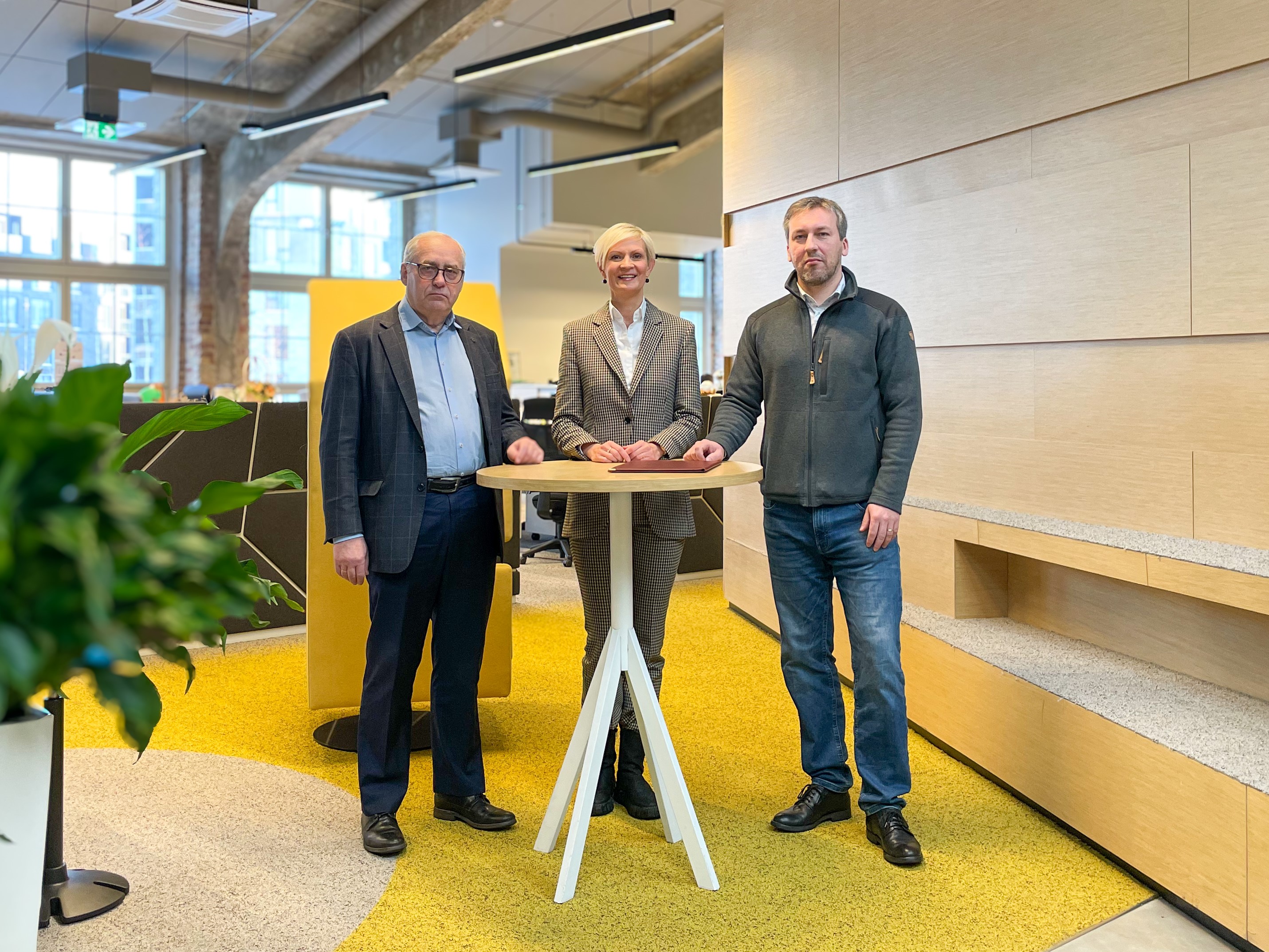-
Other audit services
We help clients with the application and use of foreign financial aid of EU and other funds and help prepare financial reports.
-
Audit calculator
The calculator will answer if the company's sales revenue, assets or number of employees exceed the limit of an inspection or audit.
-
Payroll and related services
We perform payroll accounting for companies whether they employ a few or hundreds of employees.
-
Tax accounting
Grant Thornton Baltic's experienced tax specialists support accountants and offer reasonable and practical solutions.
-
Reporting
We prepare annual reports in a timely manner. We help to prepare management reports and various mandatory reports.
-
Consolidation of financial statements
Our experienced accountants and advisors help you prepare consolidation tables and make the consolidation process more efficient.
-
Consultancy and temporary staff
Our experienced specialists advise on more complex accounting transactions, rectify poor historic accounting, and offer the temporary replacement of an accountant.
-
Outsourced CFO service
Our CFO service is suitable for companies of all sizes and in all industries. We offer services to our clients in the required amount and competences.
-
Assessment of accounting processes
We help companies to implement accounting practices that are in compliance with local and international standards.
-
Accounting services for small businesses
We offer affordable service for small businesses. We help organize processes as smartly and cost-effectively as possible.
-
Cryptocurrency accounting
We keep up with blockchain technology to serve and advise crypto companies. We are supported by a network of colleagues in 130 countries.
-
Trainings and seminars
Our accountants have experience in all matters related to accounting and reporting. We offer our clients professional training according to their needs.

-
Business advisory
We offer legal support to both start-ups and expanding companies, making sure that all legal steps are well thought out in detail.
-
Fintech advisory
Our specialists advise payment institutions, virtual currency service providers and financial institutions.
-
Corporate advisory
We advise on legal, tax and financial matters necessary for better management of the company's legal or organizational structure.
-
Transaction advisory
We provide advice in all aspects of the transaction process.
-
Legal due diligence
We thoroughly analyze the internal documents, legal relations, and business compliance of the company to be merged or acquired.
-
In-house lawyer service
The service is intended for entrepreneurs who are looking for a reliable partner to solve the company's day-to-day legal issues.
-
The contact person service
We offer a contact person service to Estonian companies with a board located abroad.
-
Training
We organize both public trainings and tailor made trainings ordered by clients on current legal and tax issues.

-
Business model or strategy renewal
In order to be successful, every company, regardless of the size of the organization, must have a clear strategy, ie know where the whole team is heading.
-
Marketing and brand strategy; creation and updating of the client management system
We support you in updating your marketing and brand strategy and customer management system, so that you can adapt in this time of rapid changes.
-
Coaching and development support
A good organizational culture is like a trump card for a company. We guide you how to collect trump cards!
-
Digital services
Today, the question is not whether to digitize, but how to do it. We help you develop and implement smart digital solutions.
-
Sales organisation development
Our mission is to improve our customers' business results by choosing the right focuses and providing a clear and systematic path to a solution.
-
Business plan development
A good business plan is a guide and management tool for an entrepreneur, a source of information for financial institutions and potential investors to make financial decisions.
-
Due diligence
We perform due diligence so that investors can get a thorough overview of the company before the planned purchase transaction.
-
Mergers and acquisitions
We provide advice in all aspects of the transaction process.
-
Valuation services
We estimate the company's market value, asset value and other asset groups based on internationally accepted methodology.
-
Forensic expert services
Our experienced, nationally recognized forensic experts provide assessments in the economic and financial field.
-
Business plans and financial forecasts
The lack of planning and control of cash resources is the reason often given for the failure of many businesses. We help you prepare proper forecasts to reduce business risks.
-
Outsourced CFO service
Our CFO service is suitable for companies of all sizes and in all industries. We offer services to our clients in the required amount and competences.
-
Reorganization
Our experienced reorganizers offer ways to overcome the company's economic difficulties and restore liquidity in order to manage sustainably in the future.
-
Restructuring and reorganisation
We offer individual complete solutions for reorganizing the structure of companies.
-
Corporate taxation
We advise on all matters related to corporate taxation.
-
Value added tax and other indirect taxes
We have extensive knowledge in the field of VAT, excise duties and customs, both on the national and international level.
-
International taxation
We advise on foreign tax systems and international tax regulations, including the requirements of cross-border reporting.
-
Transfer pricing
We help plan and document all aspects of a company's transfer pricing strategy.
-
Taxation of transactions
We plan the tax consequences of a company's acquisition, transfer, refinancing, restructuring, and listing of bonds or shares.
-
Taxation of employees in cross-border operations
An employee of an Estonian company abroad and an employee of a foreign company in Estonia - we advise on tax rules.
-
Tax risk audit
We perform a risk audit that helps diagnose and limit tax risks and optimize tax obligations.
-
Representing the client in Tax Board
We prevent tax problems and ensure smooth communication with the Tax and Customs Board.
-
Taxation of private individuals
We advise individuals on personal income taxation issues and, represent the client in communication with the Tax and Customs Board.
-
Pan-Baltic tax system comparison
Our tax specialists have prepared a comparison of the tax systems of the Baltic countries regarding the taxation of companies and individuals.
-
Recruitment services – personnel search
We help fill positions in your company with competent and dedicated employees who help realize the company's strategic goals.
-
Recruitment support services
Support services help to determine whether the candidates match the company's expectations. The most used support services are candidate testing and evaluation.
-
Implementation of human resource management processes
We either assume a full control of the launch of processes related to HR management, or we are a supportive advisory partner for the HR manager.
-
Audit of HR management processes
We map the HR management processes and provide an overview of how to assess the health of the organization from the HR management perspective.
-
HR Documentation and Operating Model Advisory Services work
We support companies in setting up HR documentation and operational processes with a necessary quality.
-
Employee Surveys
We help to carry out goal-oriented and high-quality employee surveys. We analyse the results, make reports, and draw conclusions.
-
HR Management outsourcing
We offer both temporary and permanent/long-term HR manager services to companies.

-
Internal audit
We assist you in performing the internal audit function, performing internal audits and advisory work, evaluating governance, and conducting training.
-
Internal Audit in the Financial Services Sector
We provide internal audit services to financial sector companies. We can support the creation of an internal audit function already when applying for a sectoral activity license.
-
Audit of projects
We conduct audits of projects that have received European Union funds, state aid, foreign aid, or other grants.
-
Prevention of money laundering
We help to prepare a money laundering risk assessment and efficient anti-money laundering procedures, conduct internal audits and training.
-
Risk assessment and risk management
We advise you on conducting a risk assessment and setting up a risk management system.
-
Custom tasks
At the request of the client, we perform audits, inspections and analyzes with a specific purpose and scope.
-
External Quality Assessment of the Internal Audit Activity
We conduct an external evaluation of the quality of the internal audit or provide independent assurance on the self-assessment.
-
Whistleblowing and reporting misconduct
We can help build the whistleblowing system, from implementation, internal repairs and staff training to the creation of a reporting channel and case management.
-
Sustainability advisory
We help solve issues related to the environment, social capital, employees, business model and good management practices.
-
Sustainability audit
Our auditors review and certify sustainability reports in accordance with international standards.
-
Sustainable finance
We help investors to analyze the environmental issues, social responsibility and good management practices of the company of interest.
-
Sustainable tax
Our international tax specialists define the concept of sustainable tax behavior and provide services related to sustainable tax behavior.
-
Digital strategy
We help assess the digital maturity of your organization, create a strategy that matches your needs and capabilities, and develop key metrics.
-
Intelligent automation
We aid you in determining your business’ needs and opportunities, as well as model the business processes to provide the best user experience and efficiency.
-
Business Intelligence
Our team of experienced business analysts will help you get a grip on your data by mapping and structuring all the data available.
-
Cybersecurity
A proactive cyber strategy delivers you peace of mind, allowing you to focus on realising your company’s growth potential.
-
Innovation as a Service
On average, one in four projects fails and one in two needs changes. We help manage the innovation of your company's digital solutions!

Inflation has led to a situation where more companies than ever need audit services, but auditors are not welcoming the increase in volume – even as unemployment rises overall, they are facing a workforce shortage.
In years past, the annual numbers have hovered around 8000 to 8500, but this year demand for audits has been up by 1000. “Audit firms are not prepared to meet that demand,” said the president of the Auditors’ Association Märt-Martin Arengu in the Äripäev radio broadcast “Kasvukursil”.
“In my decades-long career, I have not had to say ‘no’ to as many audit queries as I had to this past year,” said Grant Thornton Baltic’s managing partner and sworn auditor Mati Nõmmiste. “If you develop an urgent need for more staff, it is simply not to be had on the market – we can get people who are fresh graduates and have little experience and they need to be trained and the process can take 3-4 years. If you have one builder, they can’t build two houses at the same time.”

Photo: Kerli Nõmm.
In the Äripäev studio were Mati Nõmmiste (left), Imbri Jürgen and Märt-Martin Arengu.
Inflation revealed the shortcomings
The rise in the number of orders came above all from rising inflation, said Arengu. A number of companies found their net worth increase, putting them past the threshold where audit was required.
Arengu said it pointed even more starkly to the problem that audit service fees in Estonia are among the lowest in Europe. “These prevent creation of buffers and keeping people on retainer for the case that someone asks for service,” he said.
The size of the audit firms’ market in the financial year ended in June was 70 million euros in Estonia, and audit services made up 40 million of that. But the number of sworn auditors serving that market remains a stable 350.
“At the same time, the number of audit firms has consistently dropped,” said Arengu. “There are half as many companies, and a deficit has arisen.”
Nõmmiste said the growth in new auditors has also slowed. “In the closing decades of the last century, there were even some years where 100 certified auditors came into our ranks, now it is 10 and if half of the boom-era ones leave the profession and 10 new ones come in, the problem will only deepen.”
In addition, expectations of auditors have risen. “The new regulations are voluminous, the volume of standards has grown. People are getting older and are not interested in work in such a volume.”
AI steps in
At the same time, larger audit firms are contributing to adoption of AI in the global perspective. “Budgets are large and there will undoubtedly be some sort of benefit from it and it will impact both the big networks and Estonian offices,” says Arengu.
But he also referred to the problem that this will increase inequality on the audit services market as not all will have the capacity to invest in the same extent into adoption of AI.
Nõmmiste emphasizes that today’s auditors and accountants don’t have to worry about job loss.
“I remember well back in the mid-1980s when I was the chief accountant of a large corporation, everyone was worried that computers would do all the work – I haven’t seen that accountants have become irrelevant.“ Nõmmiste says only the nature of the work will change and AI helps people be more productive and do higher-quality work.
“A certain type of work will disappear, but even if the routine and uninteresting work goes away, dispensing post-analysis recommendations and the ability to create generalizations will remain necessary. The field of law and the economy are not solvable to the point where mathematical models could be used to plan events in advance.”
An array of solutions
Arengu envisions a short-term solution to ease the workforce drought as the joint assistant service being developed in the Auditors’ Association – the standardized and rote parts of the auditing process can be outsourced to accounting firms. “We are currently piloting this project, and it is a way of reducing the workload.”
Arengu also says better use could be made of existing resources. He notes that of the 350 existing sworn auditors, only 200 are providing audit services. “We have 150 sworn auditors who do not do so, and we have now called on them to return to their roots, proposed that they could found a practice or work with an existing firm.”
As the most radical step, the Auditors' Association and the Chamber of Commerce and Industry have tabled a proposal to change the thresholds for auditor services.
“With the major increase in prices, we saw that it was time to make corrections to the thresholds. Hiking the thresholds would mean many of the companies that recently became subject to audit requirements solely due to inflation would once again be exempted. “The feedback from the Ministry of Finance was that this step will likely be possible in 2024. So the auditing workload could be reduced for as many as 2000 companies.”
Auditors are also thinking about raising their prices. The salaries of specialists can be made more competitive so that the start-up and IT sector, baking and telecoms do not pull auditors away from the auditing companies. “The problem of drift to other sectors would definitely be reduced,” said Nõmmiste.
A competitor on the market – legal services
On top of everything else, companies on the auditor services market have to compete with legal services – the legal profession needs workforce who have a similar set of qualifications and are expected to orient in the world of new regulations, technologies and standards related to ESG.
Legal services are a broader field. “There are more attorneys than auditors, the Bar Association has 1145 members, and 800 are active,” said Estonian Bar Association chairman Imbi Jürgen.
“I don’t project that the number will decrease, nor is a large increase foreseen,” she said.
Jürgen’s comments suggested that the workforce situation in the legal profession is much better than what is facing auditors. “I am very pleased to see the number of new lawyers entering the profession. We have seen a constant low-key increase in our members.”
Jürgen also noted that a number of banks and start-ups compete for specialists against the audit and legal services. “The financial sector also draws a number of people away; they are under a very large regulatory burden, so outreach takes an effort, in order to draw young people to the sector.”
Contact us!
If you have similar challenges and questions, please contact our specialists.






